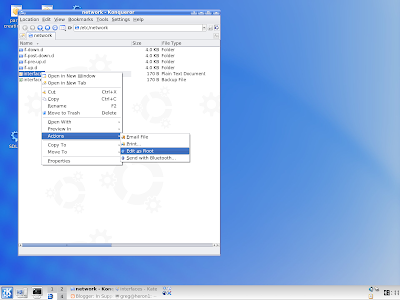- Just use Network Manager, and you're all set.
I found this to be a most annoying experience. Network manager seemed to keep forgetting my ESSID and key after I had typed it in. I'd do the network start thing, or reboot the computer, and still no wifi. Frankly, Network Manager didn't work on ubuntu version 7.04, either. - Try Network Manager, and if that doesn't work, try this advice regarding the Windows driver ...
This is horrible advice. It has folks going to try something hard (like locating the CD's with your Windows drivers) and unnecessary (Network Manager is broken, you should use other means). - Go download this program ...
Helllloooo! We're talking about a way to connect to the internet! How is someone supposed to download anything?! - Edit your interfaces file by typing sudo gedit /etc/networking/interfaces
This was obviously typed by an experienced user of ubuntu. Someone so experienced that he forgot that Hardy Heron (the kubuntu version at least) does not "come with" the gedit application. This won't work for a new install.
So here's my advice. First of all you will want to edit the file /etc/networking/interfaces as root or as superuser. In Hardy Heron, this can be done by right-clicking on the file, as shown in this screen grab below. You can click on the image to see it full size.

Now, edit the file to look like this. Note that the double-spacing is not required (or helpful). I needed to insert double spaces in order to get the file to look properly in my browser:
auto lo
iface lo inet loopback
address 127.0.0.1
netmask 255.0.0.0
auto ath0
iface ath0 inet dhcp
wireless-essid [insert your wireless essid]
wireless-key [insert your wireless key]
Then, open a Konsole or command window, and type:
sudo /etc/init.d/networking restart
And now you should be all set.

No comments:
Post a Comment